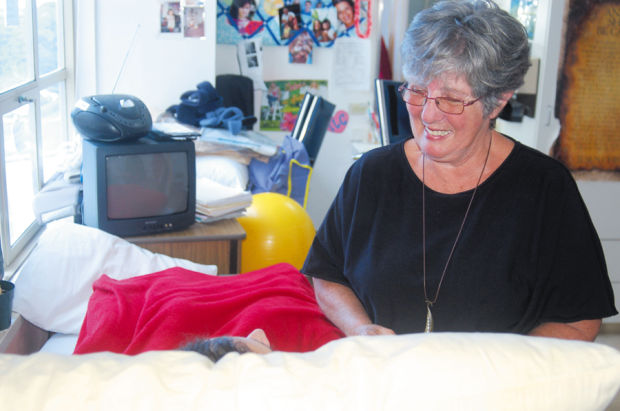LIHUE — Twice a week, Mary Ann Nordwall visits Wilcox Memorial Hospital. There, she helps Melia exercise, eat, brush her teeth, even jokes and laugh with the young woman undergoing rehabilitation. Melia communicates with the alphabet. “We say the letters
LIHUE — Twice a week, Mary Ann Nordwall visits Wilcox Memorial Hospital.
There, she helps Melia exercise, eat, brush her teeth, even jokes and laugh with the young woman undergoing rehabilitation.
Melia communicates with the alphabet.
“We say the letters and she indicates when we hit the right letters,” Nordwall says.
Nordwall spends about eight hours a week with Melia, and she does so as a volunteer with the Share the Care program.
The local chapter of the national organization has about 50 members. Their goal is simple: Alleviate caregiver stress and help families breathe a little easier knowing they aren’t alone.
“STC has their backs,” said Deborah Duda, coordinator of Kauai Share the Care.
Duda understands well the need for such help.
She cared for her mother, suffering from Parkinson’s disease and dementia, for an extended time.
“For six months, I could never sleep at night,” she said.
Finally, overwhelmed, Duda had a thought one day as she was helping her mom down some stairs.
“I thought, ‘If I just pushed her, I could sleep tonight,’” she said.
It was then she knew she needed help.
“When you think of pushing your mother, if it even crosses your mind, it means you’re in way over your head,” she said.
Within five days, her mom was in a nursing home and Duda began her own recovery of sorts.
Duda said caregivers suffer burnout — physically, financially, mentally, spiritually.
“I want people not to feel badly about how they’re feeling,” she said. “They love the person, they’re angry, impatient, tired, exhausted.”
A year ago, she helped formed Kauai Share the Care.
Since, it’s assisted about 30 families. STC volunteers, for free, care for a mother, father, daughter, son or friend who needs extra help due to illness, aging, disease or rehabilitation.
While the program operates under Kauai Hospice, it’s not limited to helping terminally ill patients.
That includes cleaning houses, mowing lawns, picking up medications, driving people to appointments or just watching out for someone.
While it’s been a success, it could use more folks like Nordwall willing to give their time.
“The more volunteers, the better we can serve the community,” Duda said.
Which is why STC’s national founder is visiting Kauai next week.
Sheila Warnock will be at the Kauai Hospice 4-5 p.m. Tuesday to meet with local volunteers and learn how her group-caring model has been adapted to Kauai.
It’s open to the public and offers a chance to learn more about the program and sign on to volunteer, too.
Nordwall became involved with Share the Care about a year and a half ago, after she and her husband moved here from the Mainland.
She volunteered because she and her husband had no family here, and she believed they might need help down the road.
She said she’s become friends with many of the families she’s helped.
“Once you get started, usually it’s hard to leave,” she said. “There is such a need. There really is a need.”
It’s not just about giving, either.
“We’re here to help her, but she ends up giving us so much in return,” Nordwall said as she visited with Melia. “She’s a really smart, loving young lady.”
Duda, author of the book, “Coming Home: A Practical and Compassionate Guide to Caring for a Dying Loved One,” said 35 million Americans in 2012 were caregivers for family and friends more than 55 years old.
According to the American Association of Retired Persons, 247,000 Hawaii residents were caregivers for family or friends.
“It’s a big national problem, it’s a world problem, it’s a Kauai problem,” she said.
Which is why there are volunteer movements like Share the Care gaining support.
“What’s happened with Share the Care is we’ve inspired a lot of other people. It’s like pebbles in the pond. People heard about what we were doing here.”
On Kauai, it has six regions, each with a coordinator who receives requests for help. There’s an assessment, and then meetings with possible supporters, including family, friends and church groups.
If there’s not enough, STC volunteers step up as an extended family.
But Duda said they’re careful not to overwork volunteers.
“What we tell our volunteers, do only what you like, when you want to do it. We don’t want you burning out,” she said.
Share the Care, Duda said, builds community. It takes away fear and despair.
“It helps heal,” she said.
Information: Deborah Duda 332-7668.


